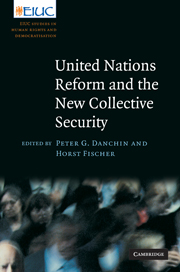Book contents
- Frontmatter
- Contents
- List of contributors
- Series editors' preface
- Preface
- List of abbreviations
- Introduction: the new collective security
- PART I Law and politics in United Nations reform
- PART II Defining “threats” to collective security
- PART III Prevention and responses
- 7 On the far side of conflict: the UN Peacebuilding Commission as optical illusion
- 8 The new peacebuilding architecture: an institutional innovation of the United Nations
- 9 The World Summit process and UN sanctions reform: between rhetoric and force
- 10 The UN response to the evolving threat of global terrorism: institutional reform, rivalry, or renewal?
- 11 International justice and collective security: between pragmatism and principle
- PART IV Perspectives on the ground
- Bibliography
- Index
9 - The World Summit process and UN sanctions reform: between rhetoric and force
from PART III - Prevention and responses
Published online by Cambridge University Press: 05 May 2010
- Frontmatter
- Contents
- List of contributors
- Series editors' preface
- Preface
- List of abbreviations
- Introduction: the new collective security
- PART I Law and politics in United Nations reform
- PART II Defining “threats” to collective security
- PART III Prevention and responses
- 7 On the far side of conflict: the UN Peacebuilding Commission as optical illusion
- 8 The new peacebuilding architecture: an institutional innovation of the United Nations
- 9 The World Summit process and UN sanctions reform: between rhetoric and force
- 10 The UN response to the evolving threat of global terrorism: institutional reform, rivalry, or renewal?
- 11 International justice and collective security: between pragmatism and principle
- PART IV Perspectives on the ground
- Bibliography
- Index
Summary
The UN Secretary-General's High-Level Panel (HLP) proposed some broad and sweeping changes to the UN's collective security practices in its 2004 report to the General Assembly, A More Secure World. As several chapters in this collection demonstrate, the bulk of the HLP's initial recommendations were seriously diluted in the two major documents that took the HLP's recommendations forward, Secretary-General Kofi Annan's report to the General Assembly (GA), In Larger Freedom, and the GA's final product itself, the World Summit Outcome. But sanctions reform represents an exception to this rule. A number of the HLP's more important recommendations are endorsed by the World Summit Outcome. Moreover, UN member states actually complemented the HLP's proposals with some additional initiatives of their own in the World Summit Outcome. Yet, despite the surprisingly progressive approach on sanctions reform exhibited in the World Summit Outcome, the final proposal could have been bolder still. First, the GA could and should have gone further in suggesting additional reforms to address failings of the UN sanctions system from a rule-of-law perspective. Second, although the appearance of reform proposals in the World Summit Outcome represents an important articulation of reform aspirations, the real question is what, if any, impact these proposals will have upon the Security Council's application and oversight of sanctions in practice.
This chapter traces the attempt to prompt UN sanctions reform through the process that began with the HLP's A More Secure World and culminated in the General Assembly's World Summit Outcome.
- Type
- Chapter
- Information
- United Nations Reform and the New Collective Security , pp. 235 - 249Publisher: Cambridge University PressPrint publication year: 2010



